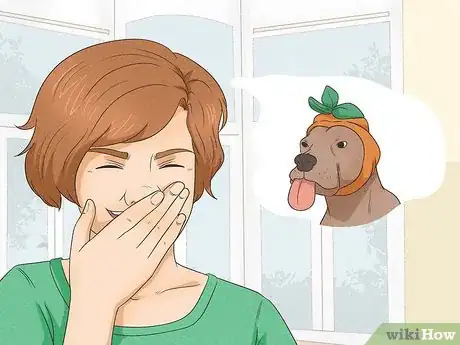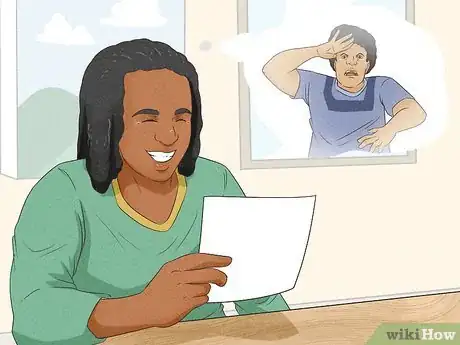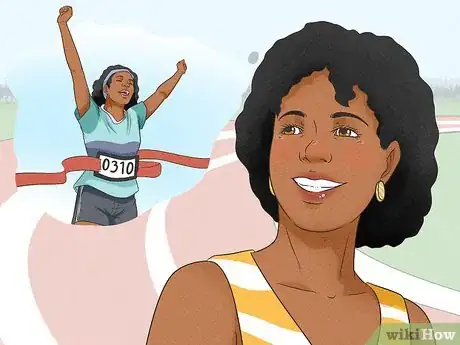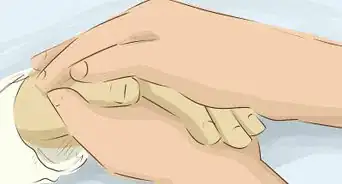This article was co-authored by Ben Whitehair and by wikiHow staff writer, Jessica Gibson. Ben Whitehair is a Social Media Expert and the Chief Operating Officer (COO) of TSMA Consulting. With over a decade of experience in the social media space, he specializes in leveraging social media for business and building relationships. He also focuses on social media’s impact on the entertainment industry. Ben graduated summa cum laude from The University of Colorado at Boulder with BAs in Theatre and Political Science as well as a Leadership Certificate. In addition to his work as CIO, Ben is a certified business and mindset coach and National Board Member of SAG-AFTRA. He is also a successful entrepreneur as the Co-Founder of Working.Actor, the premier business academy and coaching community for actors.
There are 8 references cited in this article, which can be found at the bottom of the page.
This article has been viewed 246,997 times.
People always talk about how hard it is to cry on cue, but laughing can be tricky, too! Fortunately, there are lots of little tricks for delivering a believable, natural laugh. These are really helpful for actors, but you can even pick up tips that may come in handy during socially awkward situations. It all comes down to getting in a funny frame of mind—then the laughs will follow.
Steps
Expert Q&A
-
QuestionHow can I laugh on cue during a play?
 Ben WhitehairBen Whitehair is a Social Media Expert and the Chief Operating Officer (COO) of TSMA Consulting. With over a decade of experience in the social media space, he specializes in leveraging social media for business and building relationships. He also focuses on social media’s impact on the entertainment industry. Ben graduated summa cum laude from The University of Colorado at Boulder with BAs in Theatre and Political Science as well as a Leadership Certificate. In addition to his work as CIO, Ben is a certified business and mindset coach and National Board Member of SAG-AFTRA. He is also a successful entrepreneur as the Co-Founder of Working.Actor, the premier business academy and coaching community for actors.
Ben WhitehairBen Whitehair is a Social Media Expert and the Chief Operating Officer (COO) of TSMA Consulting. With over a decade of experience in the social media space, he specializes in leveraging social media for business and building relationships. He also focuses on social media’s impact on the entertainment industry. Ben graduated summa cum laude from The University of Colorado at Boulder with BAs in Theatre and Political Science as well as a Leadership Certificate. In addition to his work as CIO, Ben is a certified business and mindset coach and National Board Member of SAG-AFTRA. He is also a successful entrepreneur as the Co-Founder of Working.Actor, the premier business academy and coaching community for actors.
Acting Coach The more you're actually embedded in the character and the story, the easier it will be. Focus more on communicating with the other person than the final effect. I find that building a connection with whomever I'm in the scene with helps because then I'm having a genuine human connection.
The more you're actually embedded in the character and the story, the easier it will be. Focus more on communicating with the other person than the final effect. I find that building a connection with whomever I'm in the scene with helps because then I'm having a genuine human connection. -
QuestionHow can I practice laughing on cue by myself?
 Ben WhitehairBen Whitehair is a Social Media Expert and the Chief Operating Officer (COO) of TSMA Consulting. With over a decade of experience in the social media space, he specializes in leveraging social media for business and building relationships. He also focuses on social media’s impact on the entertainment industry. Ben graduated summa cum laude from The University of Colorado at Boulder with BAs in Theatre and Political Science as well as a Leadership Certificate. In addition to his work as CIO, Ben is a certified business and mindset coach and National Board Member of SAG-AFTRA. He is also a successful entrepreneur as the Co-Founder of Working.Actor, the premier business academy and coaching community for actors.
Ben WhitehairBen Whitehair is a Social Media Expert and the Chief Operating Officer (COO) of TSMA Consulting. With over a decade of experience in the social media space, he specializes in leveraging social media for business and building relationships. He also focuses on social media’s impact on the entertainment industry. Ben graduated summa cum laude from The University of Colorado at Boulder with BAs in Theatre and Political Science as well as a Leadership Certificate. In addition to his work as CIO, Ben is a certified business and mindset coach and National Board Member of SAG-AFTRA. He is also a successful entrepreneur as the Co-Founder of Working.Actor, the premier business academy and coaching community for actors.
Acting Coach One thing you can do is film yourself. Set up a tripod and an iPhone, and film a scene that you've seen someone else do and try to do it exactly how they did. Then watch yourself on camera. You'll learn a lot by watching yourself, and you'll often see things that you didn't realize you were doing.
One thing you can do is film yourself. Set up a tripod and an iPhone, and film a scene that you've seen someone else do and try to do it exactly how they did. Then watch yourself on camera. You'll learn a lot by watching yourself, and you'll often see things that you didn't realize you were doing.
References
- ↑ https://www.backstage.com/magazine/article/top-tips-becoming-successful-comedy-actor-63688/
- ↑ https://youtu.be/f9Fuh3yLw0A?t=86
- ↑ Ben Whitehair. Social Media Expert. Expert Interview. 3 June 2021.
- ↑ https://www.backstage.com/magazine/article/top-tips-becoming-successful-comedy-actor-63688/
- ↑ https://variety.com/video/allison-janney-talks-using-a-technical-method-to-laugh-on-cue/
- ↑ https://www.npr.org/2014/05/08/310794138/how-to-tell-when-a-laugh-is-real-the-answer-is-in-a-breath
- ↑ https://youtu.be/_nyUGxRTWn0?t=427
- ↑ https://youtu.be/_nyUGxRTWn0?t=392
- ↑ https://castingfrontier.com/tips-laugh-cue/
- ↑ Ben Whitehair. Social Media Expert. Expert Interview. 3 June 2021.
About This Article
To laugh naturally on cue, you need to find the right trigger that will help you laugh genuinely. Actively look for things that make you laugh and think about what’s funny in day-to-day situations you find yourself in. For example, your name on your coffee order might be spelt completely wrong! It can also help if you memorize different jokes and references. Watch standup routines and comedies to expose yourself to a wide variety of humor. This gives you a better range of possible triggers that may help you if you have trouble laughing on cue. To perform a great natural laugh on cue, do plenty of practice at home. Stand in front of the mirror, use your triggers, and try out different kinds of laughter until you find what feels natural. For more tips on laughing naturally on cue, like how to find the right cue, read on!




































































